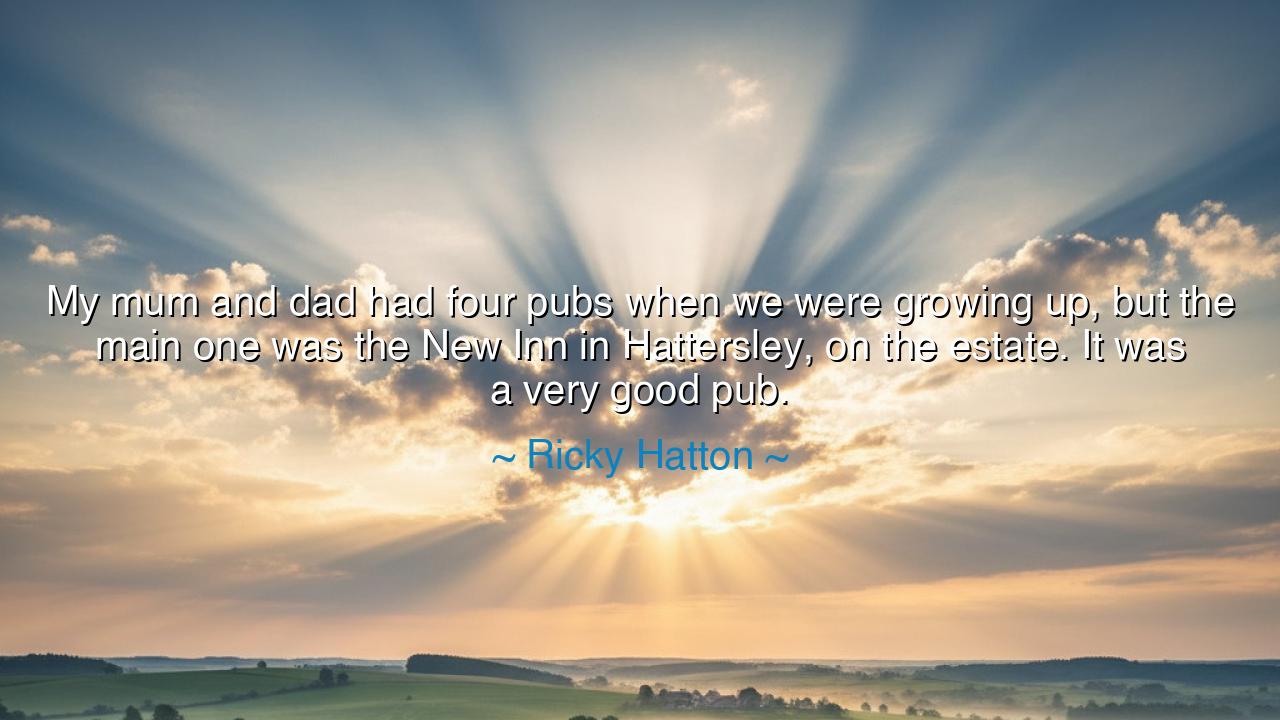
My mum and dad had four pubs when we were growing up, but the
My mum and dad had four pubs when we were growing up, but the main one was the New Inn in Hattersley, on the estate. It was a very good pub.






“My mum and dad had four pubs when we were growing up, but the main one was the New Inn in Hattersley, on the estate. It was a very good pub.” Thus spoke Ricky Hatton, the beloved fighter from Manchester, whose fists told stories in the ring and whose heart was shaped in the warmth and noise of a family pub. Though his words seem simple, they carry the quiet echo of something eternal: the power of roots, of community, and of the humble places that forge character before the world ever takes notice. In these few lines, Hatton recalls not merely a building of brick and ale, but the living heart of his upbringing—a place where laughter mingled with labor, where the lessons of resilience, loyalty, and humility were poured out like pints across the bar.
The New Inn, as Hatton describes it, was more than a pub—it was a school of life. Within its walls, he would have seen every side of humanity: the worker resting after a long shift, the elder telling tales of old days, the friend offering comfort in sorrow, and the neighbor celebrating victory. The pub, in such communities, was not just a business but a hearth—a gathering place where people came together to share both their burdens and their joys. To grow up amidst that rhythm is to grow up among stories, to learn that every man carries his own battle, and that respect, like a well-poured pint, must be earned and given in equal measure.
From such beginnings, a fighter is made—not in gyms or stadiums, but in the unseen shaping of the soul. Hatton’s childhood among pubs taught him what no formal education could: how to understand people. The boxer who would one day fight before roaring crowds first learned to read faces not in the ring, but across the bar—knowing when a man needed a laugh, when he needed space, and when he needed a listening ear. The pub became his training ground for empathy, timing, and grit—the very qualities that later made him not only a champion, but a man of the people.
The ancients, too, would have seen wisdom in such an upbringing. For just as the Greeks gathered in the agora, their open marketplace of conversation and exchange, so too did the working folk of Hattersley find their fellowship in the pub. In both, men and women shared their struggles and their dreams, binding themselves into a community stronger than any one individual. In ancient Rome, the taberna—the tavern—was often the center of life for soldiers and citizens alike, a place where hearts were unarmored, and truth could flow freely. From such places sprang both courage and compassion. So it was with the New Inn—a place where the young Hatton saw life in its raw, unvarnished form, and learned to stand proudly among his own.
There is also humility in his remembrance. Hatton does not speak of luxury or grandeur; he speaks of an ordinary pub “on the estate,” a place many would overlook. Yet from that modest corner of the world, greatness emerged. It is a lesson to all: that greatness often grows from simplicity, and that those who remember where they came from never lose their strength. The champion who stands in the light of fame but forgets his roots loses something essential. But the one who remembers—the one who honors the humble spaces that shaped him—remains unbreakable.
Consider the story of Andrew Carnegie, born in a poor Scottish village and raised in the small rooms above a weaver’s shop. Though he became one of the richest men in history, he never forgot his early lessons among the working people. He built libraries for those who, like him, sought knowledge in humble places. His strength, like Hatton’s, was drawn not from privilege, but from gratitude. For both men, heritage was not a chain that bound them—it was a foundation that anchored them against the tides of success and fame.
So let the lesson of Ricky Hatton’s words be this: honor your beginnings. No matter how small or ordinary they may seem, they are the soil in which your spirit took root. The place that raised you—be it a pub, a farm, a classroom, or a city street—holds the rhythm of who you are. Remember it, speak of it, and cherish it. For to forget where you come from is to lose the map of your soul.
And when you stand, as Hatton did, before the noise of the crowd or the trials of life, think of those early lessons—the laughter of your parents, the faces of your community, the warmth of a shared hearth. There, in that memory, lies your strength. For the greatest champions are not born of comfort, but of connection—and the truest measure of success is not how high you rise, but how deeply you remain rooted in the people and places that made you who you are.






AAdministratorAdministrator
Welcome, honored guests. Please leave a comment, we will respond soon